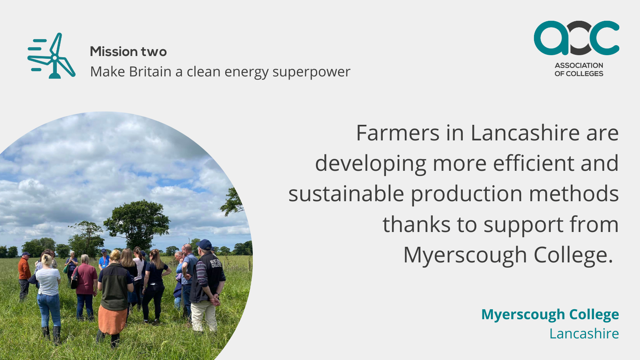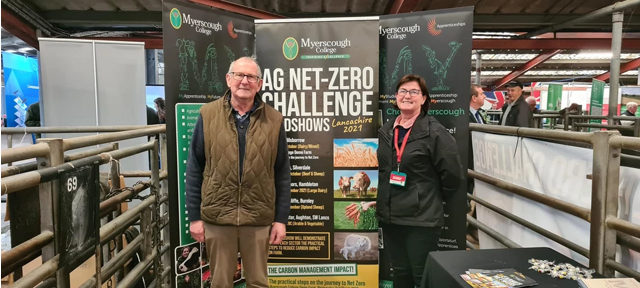
Mission accepted: The role of Myerscough College in making Britain a clean energy superpower
Published: Thursday 12 December 2024The work Myerscough College is undertaking to develop more sustainable methods in the agriculture sector has been highlighted in a new report.

The new Labour government has committed to being mission led; this formed a central theme across their 2024 election manifesto and has been reaffirmed following their election win.
At the heart of this approach are five key missions which operate as guiding stars to inform policy making and funding decisions.
To be successful, work on these missions will involve and require effective coordination from across different parts of national and devolved government who can empower local leaders to work together in new and different ways.
This week, the Association of Colleges published their “Mission accepted: the role of colleges across the government’s five missions” report, which highlights how further education colleges such as Myerscough have a crucial role to play in delivering the Government’s five missions.
There is a huge amount of unlocked potential of colleges in delivering across all five missions, which could be unleashed under the new mission-led approach. To support this, the AoC report asks the government to empower colleges to work in partnership with other local leaders across the public, third and private sectors, and ensure there are the resources to deliver.
One of the five missions is to ‘make Britain a clean energy superpower’, with Myerscough at the forefront of this.
Farmers in Lancashire are developing more efficient and sustainable production methods thanks to support from Myerscough College.

In 2023, the college became early members of the Sustainable Farmer Network, a collaboration of land-based colleges supporting farmers to achieve net zero. The network meets regularly to share new technology and innovation, and works with farmers to achieve four things: increase efficiencies and improve productivity by making better use of on-farm nutrients, reduce purchased feed and fertilizer to produce more food with less inputs in a smarter way, maintain and improve soils, hedgerows and trees, and offset grid energy with solar, wind, methane power or anaerobic digestion.
To further support with this, the Myerscough College Ag Net Zero Challenge, funded by the skills development fund, undertook 10 carbon audits on 10 different Lancashire farm types, and then delivered events across the county to support farmers to take steps to reduce farm emissions and improve business resilience.

The college farm is on its way to being net-zero through the use good nutrient management practices, soil testing all of the farmed estate to establish nutrient reserves and plan for subsequent cropping using these results.
The farm is able to variable rate slurry spread and use precision technology to spread purchased fertilizer. Self-propelled diet feeding utilises near infra-red spectrometry to measure forage dry matter, by load, enabling precision feeding therefore reducing purchased feed.
Robotics and automation have enabled dairy staff to focus on the cows, and target setting includes waste minimization, reducing waste to landfill and reducing antibiotic use.
Read the full report here
Read more:
Myerscough invited to speak at House of Lords farm support celebration
FEATURE: Industry collaboration the key to future farming
Myerscough leads project to upskill the agriculture sector in Lancashire
